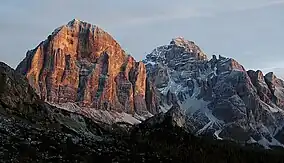| Parco naturale delle Dolomiti d'Ampezzo | |
|---|---|
 | |
| Location | Veneto, Italy |
| Coordinates | 46°37′N 12°06′E / 46.617°N 12.100°E |
| Area | 11,200 hectares |
| Established | 1990 |
| www | |
The Ampezzo Dolomites Natural Park (Italian: Parco naturale delle Dolomiti d'Ampezzo) is a nature reserve in Veneto, Italy. Established in 1990, it is entirely located in the territory of Cortina d’Ampezzo, in the Province of Belluno, and encompasses some of the most famous Dolomitic groups, such as the Tofane, Monte Cristallo, the Croda Rossa d'Ampezzo, Lagazuoi, Pomagagnon and Col Bechei. Together with the adjacent Naturpark Fanes-Sennes-Prags in the Province of Bolzano, it forms a protected area of 37,000 hectares in the heart of the Dolomites. The park has been designated as a Site of Community Importance, and about one quarter of its territory is afforded further protection through twenty smaller reserves.[1][2][3][4]
The flora includes 68 species of trees and shrubs, 32 species of ferns and over 1,000 species of flowers, including 35 species of orchids. At lower elevations, tree species include European beeches and European yews, whereas between 1,300 and 1,900 meters the sides of the valleys are covered with forests of Norway spruces. Silver firs and Scotch pines are also present; at higher elevations they are replaced by larches and Swiss pines, then by mountain pines, and finally by grasslands.[2][5][6]
The fauna includes 31 species of mammals, 113 species of birds and 16 species of amphibians, reptiles and fish. Mammals include red deer, roe deer, chamois (the most widespread large mammal in the park, with about 1,500 specimens), Alpine ibexes (reintroduced in the early 2000s and now numbering between 50 and 100 speciments), foxes, marmots, squirrels, European hares, mountain hares, European badgers, stoats, beech martens, and European pine martens. Predators such as the brown bear, the European lynxs and the golden jackal, long extinct in the region, have recently started to move back in from other Alpine areas where they have been preserved or reintroduced.[2][6]
Bird species include Western capercaillies, black grouses, rock ptarmigans, hazel grouses, Eurasian eagle-owls, golden eagles, boreal owls, Eurasian pygmy owls, Eurasian goshawks, black woodpeckers, great spotted woodpeckers, Eurasian hoopoes, bearded vultures, wallcreepers, Eurasian crag martins, and the rare Eurasian three-toed woodpeckers. Snakes include the horned viper and the European asp, and fish include River trouts and Arctic chars.[2][6]
Two visitor centres and eleven mountain huts are located in the park, which is crossed by over 300 kilometres of hiking paths, including eight vie ferrate.[1][5]
References
- 1 2 "Parco delle Dolomiti d'Ampezzo - Cortina". www.dolomitiparco.com.
- 1 2 3 4 "Parco Naturale Regionale delle Dolomiti d'Ampezzo: L'Area Protetta". www.parks.it.
- ↑ "Parco Naturale Regionale Dolomiti d'Ampezzo" (PDF). regione.veneto.it.
- ↑ "Parco Naturale delle Dolomiti d'Ampezzo". www.regole.it.
- 1 2 "Parco Naturale delle Dolomiti d'Ampezzo | Visit Dolomites". May 9, 2016.
- 1 2 3 "Il Parco Naturale delle Dolomiti d'Ampezzo - Il portale ufficiale delle dolomiti". Dolomiti.org.
External links
![]() Media related to Parco naturale regionale delle Dolomiti d'Ampezzo at Wikimedia Commons
Media related to Parco naturale regionale delle Dolomiti d'Ampezzo at Wikimedia Commons